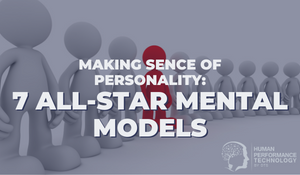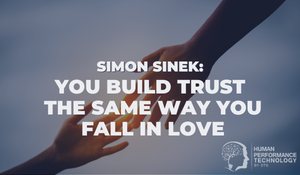The 2 Most Important Things I’ve Learned About EQ in 10 Years
I’ve been around the emotional intelligence training space for a little over a decade, during the course of which I’ve found there are a couple of insights that have the power to dramatically shift people’s thinking and fundamentally change the way they look at the world and the concept of EQ.
That’s not to suggest I’m some kind of all-wise, all-calm Zen master, and I can’t promise these insights will spark any deep spiritual awakening for you (for me, they have taken years to sink in); this is simply my observation based on encounters with facilitators, participants, and researchers who live and breathe EQ theory and development, in its many splendid forms.
But first things first: what is EQ?
Such a reasonable question! Take to Google and you can unearth any number of beautiful, well-organised, seductively confident answers. Yet, look harder, and you’ll discover it’s not the easiest thing to understand because there are many models and measurements of EQ, along with associated disputes. I’m aware that saying “it’s complicated” is a wholly unsatisfying beginning to an article, so if I may offer a practical, generally-accepted starting point, EQ can be viewed as the ability to understand and manage emotions — yours and others. The emotionally intelligent among us work effectively in teams and by themselves. Perhaps the best layperson definition of EQ I’ve come across so far: It’s about making emotions work for you, instead of against you.
The term “emotional intelligence” was first coined by Peter Salovey and John Mayer in the early 90s, popularised by Daniel Goleman in 1995, who introduced a 5-factor “mixed model” (elements consisting of self-awareness, self-regulation, motivation, empathy, social skills), and EQ has since enjoyed a meteoric rise to fame across the business world.
Why did it catch on?
For one thing, it filled a void. The concept offered to account for the successful average IQs of the world: those who didn’t fair too well in the school of standardised tests, but excelled in the school of life. Beyond an explanation for success, it handed people a sorely-missing piece of business vocabulary, the ultimate umbrella term, tying together disparate threads of “soft” skills that were hard to articulate in a job interview. The “self-aware” and “street smart” and the “enthusiastic, results-oriented team players” along with the “people-person” people, can now all simply say they have “high EQ.” (Of course, backing up that claim is another story.)
Emotional intelligence can be the difference between superior performance and mediocrity in a wide range of roles and tends to gain importance as you move up the corporate ladder. “IQ gets you hired, EQ gets you promoted,” the saying goes, and there is growing evidence to support the case that wild success or breathtaking failure in leadership is due to one’s emotional skills, over and above technical ability or expertise.
“75% of careers are derailed for reasons related to emotional competencies, including inability to handle interpersonal problems; unsatisfactory team leadership during times of difficulty or conflict; or inability to adapt to change or elicit trust.”— The Centre for Creative Leadership
Not an elixir, nor a holy grail, nor a “repeal-and-replace” of cognitive ability testing, models of EQ can be thought of as expansion packs that add layers of understanding and increasingly shed light on the complexities and intricacies of human performance. Crucially, we’re not talking about a set-in-stone trait. EQ is a skillset. If you’re prepared to work at it, just as some are willing to push their muscles at the gym, your EQ can be gradually enhanced. In fact, there’s a wealth of how-to information on the subject. It’s worth noting that every self-help book is, on some level, an implicit guide on improving EQ.
This is why I want to focus on just two core insights — the two most important things I’ve learned about emotional intelligence:
1. There are No “Negative” Emotions
We detest ambiguity. Humans, I mean. It seems to be deep in our nature to need to order things into opposing dualities of good-vs.-evil, right-vs.-wrong, light-vs.-dark, and it’s common to see emotions categorised along these lines. It’s tempting then to think of the highest goal of human life as “no negative” — that is, enlightenment, nirvana, or true bliss attained via the total elimination of “bad” states like anger, sadness, and stress. But that’s a limiting frame.
Emotions aren’t inherently good or bad; they’re better or worse in times and ways.
Just as cheeriness all the time, dialed to the maximum would be unhealthy and inappropriate (say, at a funeral), the complete removal of anger would make you a perfect victim. On the other hand, excessive anger is going to make people around you into needless victims. To echo Aristotle, it’s the easiest thing in the world to get angry, but to be angry with the right person, in the right way, at the right time, for the right purpose — that isn’t easy. It takes judgment and strength.
That all emotions have their place and serve important adaptive functions is what Disney showed with Inside Out, and at this point in my life all I’m willing to say for certain is that Disney is the one solid bedrock of human wisdom.
2. You Are Not Your Emotions
Psychologist Susan David once said something that’s worth reading slowly and more than once: “Emotions are data, not directives.” (Has a nice ring to it.) She goes on to describe the common mistake of confusing what we feel with who we are: “Try not to say ‘I am angry’ or ‘I am sad.’ When you say ‘I am,’ it makes you sound as if you are the emotion, whereas you are you and the emotion is a data source.”
Feeling irritation doesn’t mean you have to express upset. It doesn’t mean you have to suppress it, either. As with standing on the shore watching waves rise and fall across the ocean horizon, you can create a kind of internal space where you notice emotions as they come and go, arrive and depart, churn and flow, without attaching your ego or identity to any of the inward activity. Some ancient traditions call this space “meditation.”
Ultimately, it comes back to timing and choice: there are times in life when it’s a good idea to go with the current and get swept up in a tidal force of productive emotional energy, and there are many instances when it makes sense to take a step back, evaluate the risks of moving forward (to yourself and to others), and let the waves pass.
For more on EQ, check out this infographic.
Topics:
Emotional Intelligence
Theo Winter
Client Services Manager, Writer & Researcher. Theo is one of the youngest professionals in the world to earn an accreditation in TTI Success Insight's suite of psychometric assessments. For more than a decade, he worked with hundreds of HR, L&D and OD professionals and consultants to improve engagement, performance and emotional intelligence of leaders and their teams. He authored the book "40 Must-Know Business Models for People Leaders."



We Would Like to Hear From You (0 Comments)